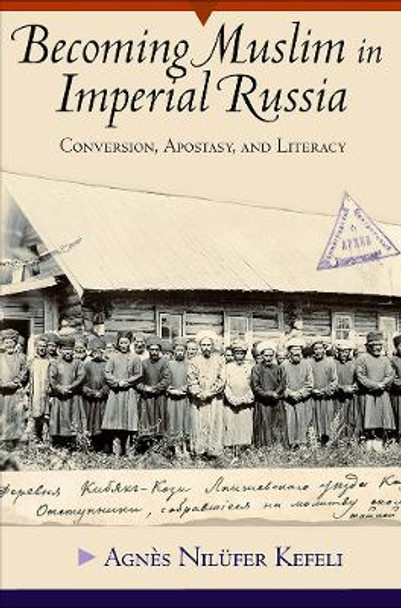Description
In the nineteenth century, the Russian Empire's Middle Volga region (today's Tatarstan) was the site of a prolonged struggle between Russian Orthodoxy and Islam, each of which sought to solidify its influence among the frontier's mix of Turkic, Finno-Ugric, and Slavic peoples. The immediate catalyst of the events that Agnes Nilufer Kefeli chronicles in Becoming Muslim in Imperial Russia was the collective turn to Islam by many of the region's Krashens, the Muslim and animist Tatars who converted to Russian Orthodoxy between the sixteenth and eighteenth centuries.
The traditional view holds that the apostates had really been Muslim all along or that their conversions had been forced by the state or undertaken voluntarily as a matter of convenience. In Kefeli's view, this argument vastly oversimplifies the complexity of a region where many participated in the religious cultures of both Islam and Orthodox Christianity and where a vibrant Krashen community has survived to the present. By analyzing Russian, Eurasian, and Central Asian ethnographic, administrative, literary, and missionary sources, Kefeli shows how traditional education, with Sufi mystical components, helped to Islamize Finno-Ugric and Turkic peoples in the Kama-Volga countryside and set the stage for the development of modernist Islam in Russia. Of particular interest is Kefeli's emphasis on the role that Tatar women (both Krashen and Muslim) played as holders and transmitters of Sufi knowledge. Today, she notes, intellectuals and mullahs in Tatarstan seek to revive both Sufi and modernist traditions to counteract new expressions of Islam and promote a purely Tatar Islam aware of its specificity in a post-Christian and secular environment.
About the Author
Agnes Nilufer Kefeli is Senior Lecturer at Arizona State University.
Reviews
Agnes Kefeli's book vividly recreates the dynamic cultural world of the indigenous people of the Middle Volga region on the eve of the advent of modern education, and it places the nineteenth-century Krashen apostasy movements within the context of ethnic and religious diversity and multiplicity of available identities. Kefeli's work underscores the shifting religious and cultural boundaries among the communities located on the fault line between Islam and Christianity and demonstrates the ways in which the interaction between the two shaped and continues to shape identities in theVolga-Ural region and Russia at large. Historians, scholars of religion and literature will greatly benefit from this rich, imaginative and impeccably researched book.
-- Madina Zainullina Goldberg * Russian Review *Agnes Nilufer Kefeli's fresh, original, and comprehensively researched examination of baptized Tatar (Krashen) apostasy in the late nineteenth- and early twentieth-century tsarist state represents a major advance for scholarship on the social and religious history of imperial Russia. Relying on a diverse array of archival sources, family histories, biographies of theProphet, Sufi texts, and other genres of popular religious literature, this book treats the great Krashen apostasies, or movements to gain the state's permission to 'return' to Islam spanning the period from roughly 1802-1905, as a site of communal identity formation and negotiation. This negotiation, Kefeli argues, took place in a realm of religious practice embracing Islam, Orthodox Christianity, and animist practices common among semi-nomadicsteppe peoples.
-- Eren Tasar * Canadian Slavonic Papers *In this much-needed and fascinating study, Agnes Nilufer Kefeli unravels a story of the Krashens, baptized Tatars who apostatized in masses throughout the long nineteenth century. How and why this became possible are the central questions of this book. Kefeli skilfully shows that the apostasy movements were products of spiritual battles, conscious missionary efforts, competing religious influences, agency and religious education.The book is richly illustrated and contains useful maps of the Middle Volga. It is highly recommended for students and scholars of Muslim communities of Russian and Eurasia, Sufism in Eurasia, and modern Islamic history.
-- Rozaliya Garipova * Central Asian Survey *The Volga basin in what is now Tatarstan has been a frontier zone between the Slavic-Christian and Muslim-Turkic worlds in Eurasia for over a millennium. It provides an ideal locale for a fruitful study of religious traditions and their interactions, but very few scholars in the world have the necessary linguisticand disciplinary skills to do justice to the subject. For this reason, Agnes Kefeli's book is a tour de force. She brings tobear on her analysis a mastery of sources in Russian and Tatar, a keen understanding of popular religion and religious change, and a solid command of issues of empire.
-- Adeeb Khalid * Journal of Religion *This is an excellent book for scholars and advanced students interested in Imperial Russia's Christian-versus-Islamic struggle among peoples (primarily Tatars, but also others, such as the Chuvash, Maris, and Udmurts) in its Middle Volga region. The book's subtitle indicates its main focus, which is based on fieldwork and extensive archival and other research (indicated in copious footnotes and bibliography). The role of literacy, education, women, Tatar modernists, and the reaction of the Russian government and Orthodox Church also receive special attention. Kefeli (Arizona State Univ.) demonstrates that the apostasy of tens of thousands of Krashens (Tatar Christians) and others was much more complex than previously acknowledged.
-- W.G. Moss * Choice *This book is timely, given the growth of Islam in Europe due to immigration and conversion and renewed debates about the Krashen apostasies in Tatarstan today. Kefeli's book provides deep history to this current situation, and reminds us of the persistence of tsarist-era history into the present.
-- Eileen Kane, Connecticut College * Slavic Review *Awards
Winner of Winner of the Reginald Zelnik Book Prize in Histor.
Book Information
ISBN 9780801452314
Author Agnes Nilufer Kefeli
Format Hardback
Page Count 312
Imprint Cornell University Press
Publisher Cornell University Press
Weight(grams) 907g





